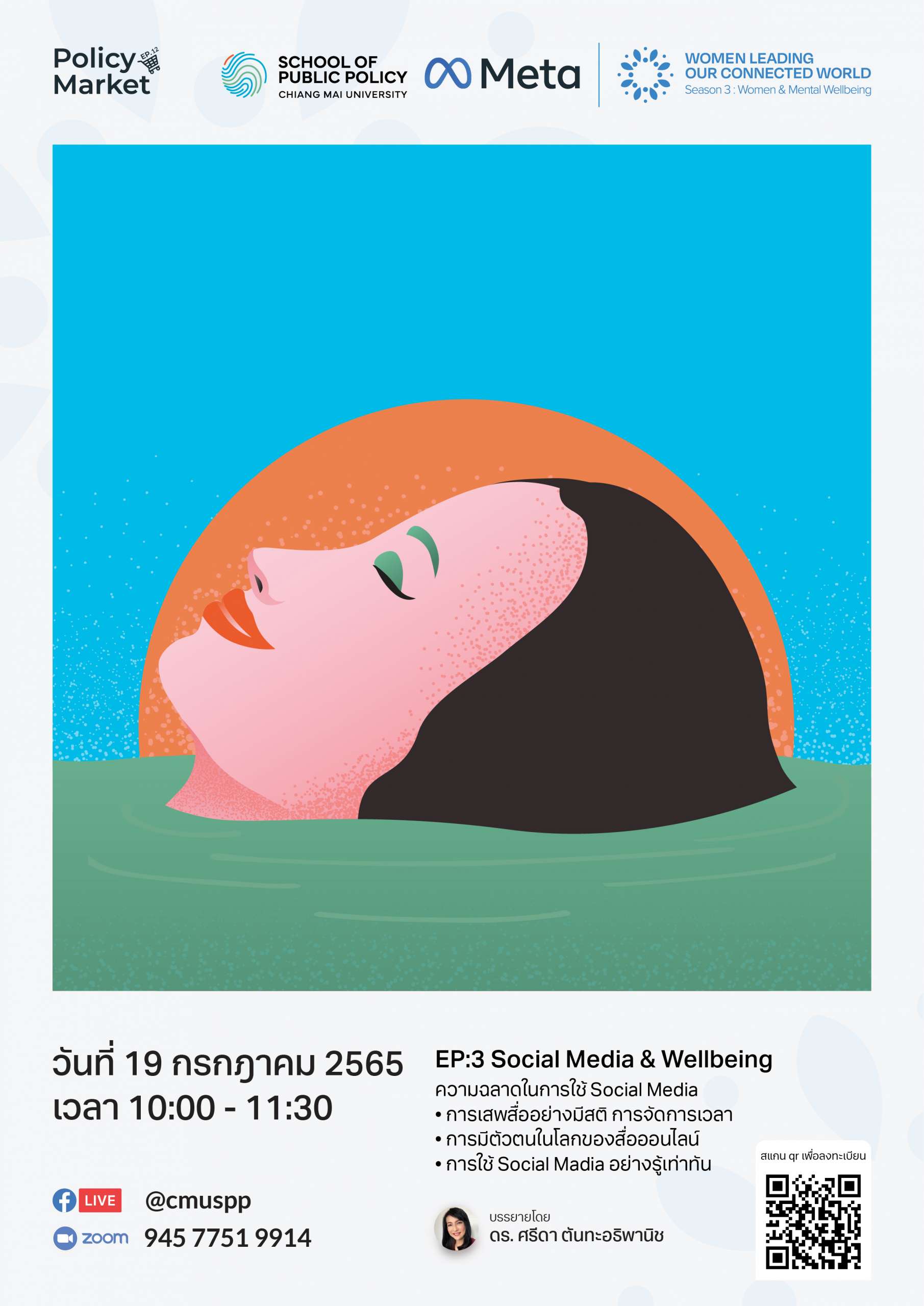Policy Market EP.12 : Women Leading Our Connected World (WOW) Season 3: Women & Mental Wellbeing

Policy Market EP.12 :
Women Leading Our Connected World (WOW) Season 3: Women & Mental Wellbeing
Problems from mental health such as schizophrenia, depression, bipolar disorder, as well as alcohol addiction are present substance abuse is a major and chronic problem in Thailand.[1] Many Thai people have depression, but many patients do not reach treatment, which leads to increased cases of suicide in Thailand. Referring to information from the Thai Depression Center, the Department of Mental Health defined 1.5 million Thais aged 15 and over, suffering from depression. A hundred patients on average had access to only 28 treatments.[2] Moreover, minor mental health issues do cause imbalances in life such as irritability, anger, insomnia, and relationship problems. These challenges prevent people from living their life to their fullest potential. It is also a silent cause of non-communicable diseases such as diabetes, cancer, heart problems, and high blood pressure.
Thailand is a patriarchal society in which women are generally tied to the role of family caretaker which usually means raising children and taking care of the elderly, as well as other household chores like cooking and cleaning. Many women in Thailand face domestic violence in their homes.[3] Women were also found to have a higher rate of depression than men. Thais attempt suicide six times an hour, or more than 53,000 people a year, resulting to about 4,000 deaths per year. According to the National Center for Suicide Prevention, Department of Mental Health shows that depression is the cause of more than 10% of successful suicide attempts, while the most important cause is relationships.[4] All of these factors are very much linked to the role of women in various settings.
A result of the survey in 2020 found Thai people had average mental health scores at 33.53 points and average mental health scores of males were higher than females. The average mental health score for males was 33.80, and for females was 33.27. As a result, males seem happier than females.[5]
There are many stressors in a woman’s life. For example depression after giving birth, chronic physical illness, losing someone important in their life, having been violently abused by a significant person in life, having problems in the family, unhealthy relationships with husband or child or husband’s family. Not to mention the stress that comes with daily life such as job-related issues, managing housework, and facing economic problems.
Hence, the most crucial policy solutions in addressing mental health problems are to raise awareness among women of their own mental health, to be able to guide others in their sphere of influence and to have access to resources to begin tackling the problem. The School of Public Policy, together with partners and networks working in the field of public health and wellbeing, have developed this project called “Women Leading Our Connected World – Season 3: Women & Mental Wellbeing (WOW III)”.
The main objective is to raise public awareness about women and mental health and to provide sound public policy recommendations that incorporate the knowledge on mental wellbeing to all other aspects of public policy. These policy recommendations are essential to enlighten the public and for various government agencies to consider developing public policies based on a solid understanding of mental health and its implications on many social issues. The mentioned knowledge includes trauma, depression, anxiety, behavior issues, addictions, and the importance of positive psychology. This knowledge should be applied to many policies such as education, urban management, social policies, welfare, poverty reduction, conflict management, law enforcement, family development, and many more.
Reference:
[1] Patcharee Bonkham. (2017). Research suggests “psychiatry” service access gaps have also been found. Retrieved from: https://www.thaihealth.or.th/Content/38395-วิจัยชี้%20/”จิตเวช/”%20ยังพบช่องว่างของการเข้าถึงบริการ.html accessed on Mar 7, 2022.
[2] MGR Online. (2022). “โรคซึมเศร้า” วิกฤตคร่าชีวิตคนไทย เข้าไม่ถึงการรักษา ฆ่าตัวตายสำเร็จสูง. Retrieved from: “โรคซึมเศร้า” วิกฤตคร่าชีวิตคนไทย เข้าไม่ถึงการรักษา ฆ่าตัวตายสำเร็จสูง (mgronline.com) accessed on Mar 7, 2022.
[3] Boonwara Sumano. (2020). Abuse against women still prevalent. Retrieved from: Abuse against women still prevalent – TDRI: Thailand Development Research Institute accessed on Mar 7, 2022.
[4] MGR Online. (2022). “โรคซึมเศร้า” วิกฤตคร่าชีวิตคนไทย เข้าไม่ถึงการรักษา ฆ่าตัวตายสำเร็จสูง. Retrieved from: “โรคซึมเศร้า” วิกฤตคร่าชีวิตคนไทย เข้าไม่ถึงการรักษา ฆ่าตัวตายสำเร็จสูง (mgronline.com) accessed on Mar 7, 2022.
[5] National Statistical Office. (2021). Summary Survey of Mental Health (Happiness) of Population in Thailand, 2020. Retrieved from: http://www.nso.go.th/sites/2014/DocLib13/ด้านสังคม/สาขาสุขภาพ/ความสุข/2563/190864_11.pdf









